DUBAI/ISLAMABAD: An Iranian strike on Pakistan this week that drew a rapid military riposte and raised fears of greater regional turmoil was driven by Iran’s efforts to reinforce its internal security rather than its ambitions for the Middle East, according to three Iranian officials, one Iranian insider and an analyst.
Both the heavily-armed neighbors, oftentimes at odds over instability on their frontier, appear to want to try to contain the strains resulting from the highest-profile cross-border intrusions in recent years, two analysts and two of the officials said.
Iran sent shockwaves around the region on Tuesday with a missile strike against what it described as hard-line militants in southwest Pakistan. Two days later, Pakistan in retaliation attacked what it said were separatist militants in Iran — the first air strike on Iranian soil since the 1980-88 Iran-Iraq war.
Tuesday’s strike was one of Iran’s toughest cross-border assaults on the militant Jaish Al-Adl group in Pakistan, which it says has links to Daesh. Many of Jaish’s members previously belonged to a now-defunct militant group known as Jundallah that had pledged allegiance to Daesh.
The move deepened worries about Middle East instability that have spread since the Israel-Hamas war erupted in October. Iran-allied militias from Yemen to Lebanon have launched strikes on US and Israeli targets, including on Red Sea shipping, in sympathy with Gaza’s Palestinians.
It also came a day after Iran launched attacks in Iraq and Syria, which it said targeted Israeli espionage and Daesh operations, respectively.
But the tit-for-tat blows between Iran and Pakistan occurred far from that war zone, in remote borderlands where separatist groups and religiously motivated militants have long carried out attacks on government targets, with officials in Pakistan and Iran often accusing each other of complicity in the bloodshed.
Gregory Brew, an analyst at Eurasia Group, an international risk consultancy, said Tehran’s strikes were motivated in large part by Iran’s rising concerns about the threat of domestic militant violence in the wake of a deadly Jan. 3 bombing claimed by Daesh.
“There’s a lot of domestic pressure to ‘do something,’ and the leadership is responding to that pressure,” he said.
Spokespeople for the Iranian and Pakistani foreign ministries could not immediately be reached for comment.
‘CRUSHING RESPONSE’
Pakistan recalled its ambassador from Iran in protest at Tuesday’s attack. For its part, Tehran strongly condemned Pakistan’s strikes on Thursday, saying civilians were killed, and summoned Pakistan’s most senior diplomat in Iran to give an explanation.
But in their statements, neither government sought to make a link to the Gaza war or to attacks carried out in support of Palestinians by a network of Arab militias allied to Iran from the Mediterranean to the Gulf.
In a public statement on Thursday, the foreign ministry in Tehran said: “Iran considers the security of its people and its territorial integrity as a red line” and expects “friendly and brotherly” Pakistan to prevent armed militant bases on its soil.
For Iran, the trigger for the flare-up was a devastating bombing on Jan. 3 that killed nearly 100 people at a ceremony in the southeastern city of Kerman to commemorate commander Qassem Soleimani, who was killed by a US drone in 2020.
Soleimani, architect of Iran’s drive to extend its influence across the Middle East, was a hero to supporters of the hard-line establishment. Tehran publicly vowed revenge against Daesh, the ultra-hard-line militant group that claimed responsibility for the bombing.
An Iranian insider close to the country’s ruling clerics described the Kerman bombing as “an embarrassment for the leadership” that had shown Iranian security to be vulnerable.
Tuesday’s strike was aimed at demonstrating the security organizations’ capabilities amid concern among Iranians about a lack of security in the country, the Iranian insider said.
“Such terrorist attacks will get a crushing response from Iran,” the insider said.
Iran has also arrested dozens of people linked to Daesh.
On Tuesday, Iranian missiles struck two bases of the group Jaish Al-Adl (or the Army of Justice) in Pakistan’s southwestern province of Balochistan, which borders Iran. Iran accuses the group of attacks inside its borders, particularly on the powerful Revolution Guards Corp.
A senior Iranian security official told Reuters that Iran had provided Pakistan with evidence that Jaish Al-Adl was involved in the Kerman attack, coordinating its logistics, and had asked Pakistan to act against it. Iran had obtained evidence that members of the group were among a number of militants planning further attacks in Iran, he said.
“We have warned everyone that any action against our nation, our national security will not go unanswered,” the official added, speaking on condition of anonymity due to sensitivity of the matter.
IRAN ‘LOST PATIENCE’
Iran has been pressing Islamabad for years to address the presence of militants near its border, Brew said. The missile strikes were a sign that Tehran has lost patience, he said.
To be sure, Iran continues to see its role and influence in the Middle East as a central to its security goals.
Brew said that Iran’s strike on Pakistan was also intended to signal its resolve, to both enemies and allies, to defend itself in the context of the regional crisis over Gaza.
Michael Kugelman, director of the South Asia Institute at the Wilson Center, a Washington-based think tank, said bilateral tension on border security was a longstanding problem for Iran and Pakistan.
De-escalation would be difficult in the immediate term, “given the high tensions and temperatures at play,” he said.
Neither country appears poised for conflict, however. In public statements, both countries have observed their attacks were not aimed at each other’s nationals, and signalled they don’t want escalation.
Kugelman said both countries might welcome bilateral dialogue and potential third party mediation from a country like China, which has good relations and leverage with both countries.
“Diplomacy will be critical from here on out,” he said.
Iran-Pakistan flare-up rooted in restive borderlands, not Middle East strife — analysts
https://arab.news/nf7mb
Iran-Pakistan flare-up rooted in restive borderlands, not Middle East strife — analysts
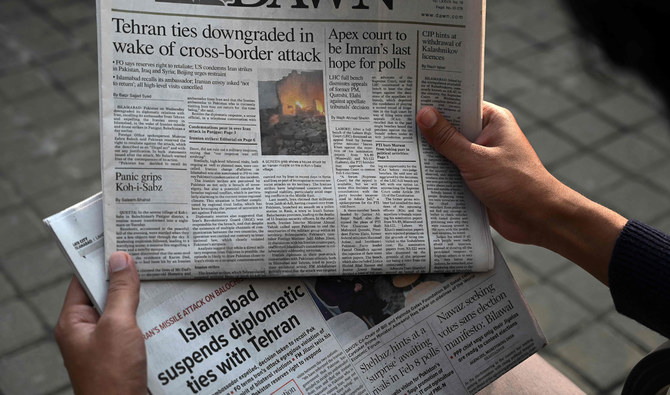
- Experts say Tehran’s strikes motivated by rising concerns about threat of domestic militant violence after deadly Jan. 3 bombing
- Neither government has sought to make link to Gaza war or attacks carried out by network of Arab militias allied to Iran
Pakistani FM, Digital Cooperation Organization’s secretary-general discuss economic cooperation in Riyadh
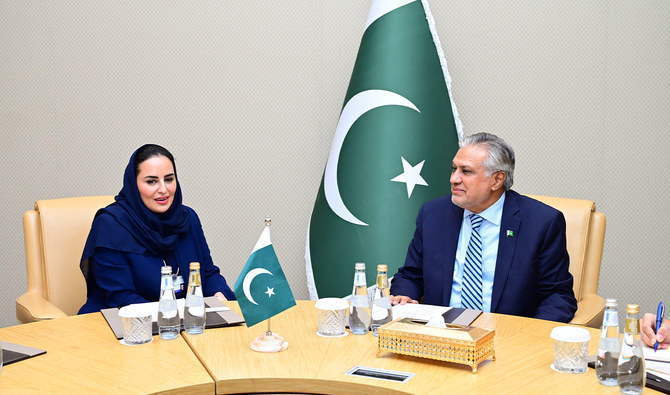
- Digital Cooperation Organization is an inter-governmental body that seeks to bridge digital gap in member states
- Foreign Minister Dar meets DCO secretary-general at sidelines of World Economic Forum meeting in Riyadh
ISLAMABAD: Pakistan’s Deputy Prime Minister and Foreign Minister Ishaq Dar and Digital Cooperation Organization’s (DCO) Secretary-General Deemah AlYahya on Sunday resolved to continue their joint collaboration and cooperation for economic development, the foreign ministry said in a statement.
The DCO is an inter-governmental body established in 2020 which is dedicated to achieving social prosperity and growth of digital economic. The DCO aims to achieve this by unifying the efforts of its member states to advance digital transformation and promote common interests of member states. DCO member states include Pakistan, Qatar, Saudi Arabia, Rwanda, Kuwait, Morocco, Nigeria, Oman, The Gambia, Ghana, Greece, Jordan, Bahrain, Bangladesh, Cyprus and Djibouti.
AlYahya is a Saudi digital economy expert and the founding secretary-general of the organization since her election to the post in April 2021. As DCO secretary-general, AlYahya is responsible for connecting heads of state, government ministers and private sector digital economy leaders to bridge the digital gap in member states.
She called on Foreign Minister Dar at the sidelines of the World Economic Forum’s Special Meeting in Riyadh on Sunday, Pakistan’s Ministry of Foreign Affairs (MoFA) said.
“The Deputy Prime Minister and Foreign Minister of Pakistan and the SG DCO affirmed their resolve to continue close collaboration and cooperation for the economic development and digital transformation of Pakistan, Saudi Arabia and other DCO member states,” MoFA said.
AlYahya recounted her visit to Pakistan earlier this month and spoke of the country’s “great potential” for technological advancement and digital transformation of its economy, MoFA said. “She emphasized that as founding member of DCO, Pakistan brings great value to the organization and has a significant role to play in its rise and progress,” it added.
Dar stressed the need for DCO member states to achieve capabilities in emerging technologies in the fast-evolving tech landscape, MoFA said. “In this connection, he appreciated DCO for providing the suitable platform to its member states for their digital advancement,” the statement said.
AlYahya separately posted about her “great meeting” with Dar on the social media platform X.
“With 64 percent of the population below 30 years old, many of whom are actively involved in the freelance industry, it is critical to ensure we undertake all collaborative efforts that will enable an ecosystem which lets the youth thrive and prosper in the new digital landscape,” she wrote on X.
PM Sharif, Saudi crown prince discuss bilateral ties and regional situation in Riyadh
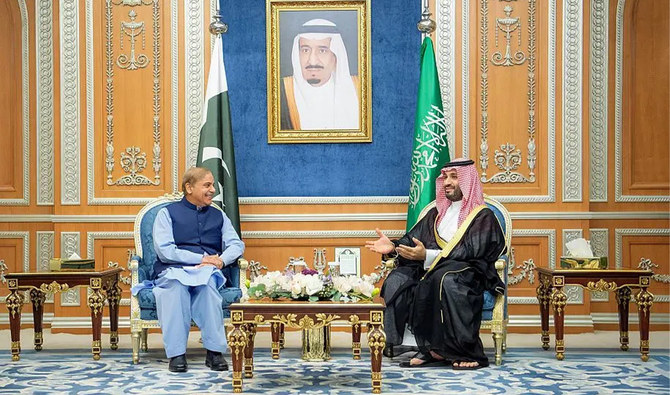
- PM Sharif attends Special Dialogue and Gala Dinner hosted by Saudi crown prince in Riyadh
- Sharif is in Riyadh to attend two-day World Economic Forum meeting, engage with world leaders
ISLAMABAD: Prime Minister Shehbaz Sharif met Saudi Crown Prince Mohammed bin Salman in Riyadh on Sunday evening during which the two leaders discussed bilateral relations between Pakistan and Saudi Arabia, the regional situation and Israel’s war on Gaza, Sharif’s office said in a statement.
Sharif, who arrived in Riyadh on Saturday to attend a two-day special meeting of the World Economic Forum, attended a Special Dialogue and Gala Dinner hosted by the Saudi crown prince in Riyadh. Sharif congratulated the Saudi crown prince for successfully organizing the WEF Special Meeting, the Prime Minister’s Office (PMO) said.
“The Prime Minister conveyed his prayers and good wishes for the health, happiness and long life of The Custodian of the Two Holy Mosques His Majesty King Salman bin Abdulaziz Al Saud,” the PMO said. “In addition to bilateral ties, the regional situation, particularly with regards to the crisis in Gaza, was also discussed.”
Sharif thanked the Saudi crown prince for sending a high-powered delegation, headed by Saudi Arabia’s Foreign Minister Minister Faisal bin Farhan, to Pakistan earlier this month. The delegation held key meetings with Pakistani ministers and businesspersons to enhance economic cooperation between the Kingdom and the South Asian country.
“To continue the discussion, the Prime Minister said that he has brought with him a high-powered delegation to Riyadh, including key Ministers responsible for investment, so that follow-up meetings could take place between relevant officials,” the PMO said.
Sharif reiterated his invitation to the Saudi crown prince to undertake an official visit to Pakistan at his earliest convenience, the PMO added.
Separately, Sharif met Saudi Arabia’s ministers of finance, investment and industry on Sunday at the sidelines of the WEF meeting. In his meeting with the Saudi finance minister, the two sides agreed that Saudi Arabia would explore more opportunities for investment in Pakistan.
Saudi Finance Minister Mohammed Al-Jadaan reiterated the Kingdom’s support for Pakistan’s economic development, Sharif’s office had said in a statement.
Pakistan and Saudi Arabia enjoy strong trade, defense and cultural ties. The Kingdom is home to over 2.7 million Pakistani expatriates and serves as the top source of remittances to the cash-strapped South Asian country.
Both Pakistan and Saudi Arabia have been closely working to increase their bilateral trade and investment, and the Kingdom recently reaffirmed its commitment to expedite an investment package worth $5 billion discussed previously with Islamabad.
Gunmen kill two laborers from Punjab province in southwest Pakistan — official
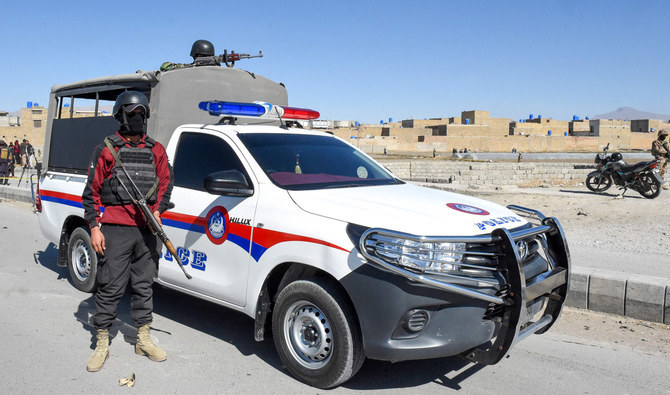
- The two laborers were working inside a garage in Tump area of Balochistan's Kech district when they came under attack
- No group immediately claimed responsibility, but Baloch separatists have previously targeted people from other provinces
ISLAMABAD: Unidentified gunmen on Sunday shot dead two laborers, who hailed from the eastern Punjab province, in the country's restive Balochistan province, a local official said.
The two laborers were working inside a garage in Tump area of Balochistan's Kech district when they came under fire by gunmen riding motorbikes, according to Saeed Umrani, commissioner of Makran Division where Kech is located.
No group immediately claimed responsibility for the attack, but Baloch separatists have previously targeted people from other provinces on suspicion of spying for state agencies.
"Both laborers, who were residents of the Punjab province, were killed on the spot," the official said.
Umrani said bodies of the deceased had been sent to their hometowns and the district administration was hunting for the perpetrators.
The attack came two weeks after armed men abducted nine passengers, who hailed from Punjab, from a bus and killed them near Balochistan's Noshki district.
The outlawed Balochistan Liberation Army claimed responsibility for the attack, saying it had information that plain-clothed spies were on the bus. The group offered no evidence to support its claim.
Balochistan has been the scene of a long-running insurgency by separatist militants who seek independence from the central government in Islamabad.
Although the government says it has quelled the insurgency, violence has continued to persist in the province.
Pakistan PM, Kuwaiti emir discuss transformation of bilateral ties into economic partnership
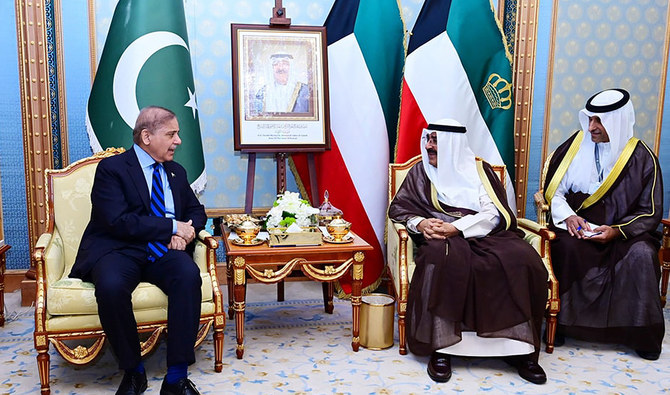
- The meeting came on the sidelines of a two-day World Economic Forum summit in Riyadh
- PM Shehbaz Sharif assured of efficient implementation of Pakistan-Kuwait deals signed in Nov.
ISLAMABAD: Pakistan Prime Minister Shehbaz Sharif on Sunday met with Emir of Kuwait Sheikh Mishal Al-Ahmad Al-Jaber Al-Sabah in Riyadh and discussed with him transformation of Pakistan-Kuwait ties into an economic partnership, Sharif’s office said.
The meeting came on the sidelines of a two-day World Economic Forum (WEF) summit on global collaboration, growth and energy on April 28-29.
PM Sharif thanked Sheikh Mishal for his congratulatory letter upon his re-election and congratulated him on assuming the role of the emir of Kuwait.
“The Prime Minister expressed his desire to work closely with His Highness to transform bilateral ties into a mutually beneficial economic partnership that would serve the best interests of the peoples of both countries,” Sharif’s office said in a statement.
The development came months after Pakistan and Kuwait signed several trade and investment agreements worth $10 billion during the visit of caretaker Pakistan PM Anwaar-ul-Haq Kakar to the Gulf country.
Besides these agreements, the two countries had signed three memorandums of understanding (MoUs) in the fields of culture, environment and sustainable development.
Pakistan’s army chief, General Asim Munir, had also accompanied the caretaker prime minister on the Kuwait visit in November, which was part of the Pakistani leadership’s ambitious plan to attract investment from the Middle East amid an economic slowdown at home.
“The Prime Minister assured the Kuwaiti leadership that these MoUs and agreements would be implemented in an efficient and timely manner,” the statement added.
“In addition to bilateral ties, the regional situation, particularly with regards to the crisis in Gaza, was also discussed.”
PM Sharif, IMF chief discuss Pakistan’s new loan program on WEF sidelines in Riyadh
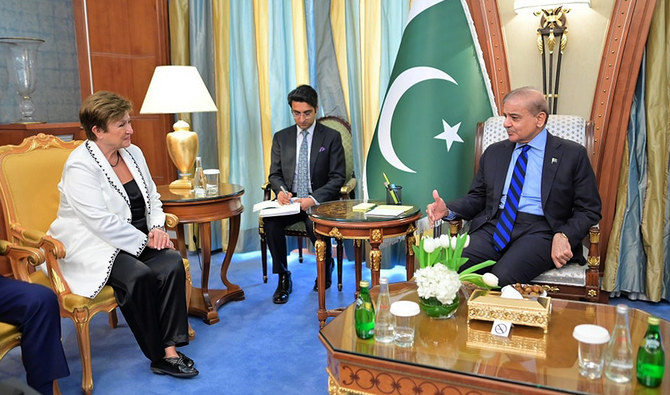
- Pakistan’s $3 billion IMF loan program, which helped Islamabad avert a default last year, is due to end this month
- Pakistan faces a chronic balance of payments crisis, with nearly $24 billion to repay in debt over next fiscal year
ISLAMABAD: Pakistan Prime Minister Shehbaz Sharif on Sunday met with International Monetary Fund (IMF) Managing Director Kristalina Georgieva in Riyadh, where the two figures discussed a new loan program for the cash-strapped South Asian country, Sharif’s office said.
The meeting between PM Sharif and the IMF managing director took place on the sidelines of a two-day World Economic Forum (WEF) summit on global collaboration, growth and energy in the Saudi capital on April 28-29.
Sharif thanked Georgieva for her support to Pakistan in securing a $3 billion IMF loan program last year that is due to expire this month. The IMF executive board is expected to meet on Monday to decide on the disbursement of the final tranche of $1.1 billion to Pakistan.
“MD IMF shared her institution’s perspective on the ongoing program with Pakistan, including the review process,” PM Sharif’s office said in a statement.
“Both sides also discussed Pakistan entering into another IMF program to ensure that the gains made in the past year are consolidated and its economic growth trajectory remains positive.”
Sharif informed the IMF chief that his government was fully committed to put Pakistan’s economy back on track, according to the statement.
He said he had directed his financial team, led by Finance Minister Muhammad Aurangzeb, to carry out structural reforms, ensure strict fiscal discipline and pursue prudent policies that would ensure macro-economic stability and sustained economic growth.
Pakistan secured the $3 billion IMF program in June last year, which helped it avert a sovereign default. Islamabad says it is seeking a loan over at least three years to help achieve macroeconomic stability and execute long-overdue reforms.
Finance Minister Aurangzeb has said Islamabad could secure a staff-level agreement on the new program by early July, though he has declined to detail what size of the program it seeks. If secured, it would be Pakistan’s 24th IMF bailout.
The $350 billion South Asian economy faces a chronic balance of payments crisis, with nearly $24 billion to repay in debt and interest over the next fiscal year — three-time more than its central bank’s foreign currency reserves.
Pakistan’s finance ministry expects the economy to grow by 2.6 percent in the fiscal year ending in June, while average inflation for the year is projected to stand at 24 percent, down from 29.2 percent the previous fiscal year.










